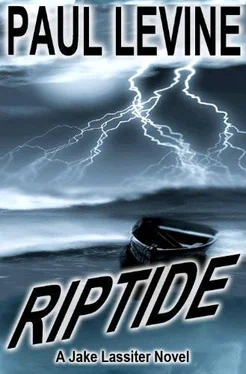Paul Levine - Riptide
Здесь есть возможность читать онлайн «Paul Levine - Riptide» весь текст электронной книги совершенно бесплатно (целиком полную версию без сокращений). В некоторых случаях можно слушать аудио, скачать через торрент в формате fb2 и присутствует краткое содержание. Жанр: Криминальный детектив, на английском языке. Описание произведения, (предисловие) а так же отзывы посетителей доступны на портале библиотеки ЛибКат.
- Название:Riptide
- Автор:
- Жанр:
- Год:неизвестен
- ISBN:нет данных
- Рейтинг книги:3 / 5. Голосов: 1
-
Избранное:Добавить в избранное
- Отзывы:
-
Ваша оценка:
- 60
- 1
- 2
- 3
- 4
- 5
Riptide: краткое содержание, описание и аннотация
Предлагаем к чтению аннотацию, описание, краткое содержание или предисловие (зависит от того, что написал сам автор книги «Riptide»). Если вы не нашли необходимую информацию о книге — напишите в комментариях, мы постараемся отыскать её.
Riptide — читать онлайн бесплатно полную книгу (весь текст) целиком
Ниже представлен текст книги, разбитый по страницам. Система сохранения места последней прочитанной страницы, позволяет с удобством читать онлайн бесплатно книгу «Riptide», без необходимости каждый раз заново искать на чём Вы остановились. Поставьте закладку, и сможете в любой момент перейти на страницу, на которой закончили чтение.
Интервал:
Закладка:
“Sounds serious. Can you take penicillin for it?”
“Wahoo, Jake. Ever see one burn up a reel? Just a flash of steel blue… whoosh… like a rocket, it’s gone.”
“Well, the fish will wait, and I need your help,” Lassiter said.
“You want to chat or you expecting a body to pop up?”
“I don’t know what’s going on. The other day, at Matheson Hammock, I didn’t exactly tell Detective Farrell the truth, the whole truth, and nothing but the truth.”
“Ah, and you want to atone for your sin, expiatum peccatum.”
“Not really. I want to tie some loose ends together, then go to Farrell. For starters, I’m trying to figure out what Berto was doing on the beach a day before he was killed.”
“Getting a suntan was out of the question, I suppose.”
“He was with the best board sailor in the world, a guy who also thinks he’s a reincarnated Hawaiian king and seems to yearn for the good old days of war canoes and flaming arrows.”
Charlie reached into a pocket of his bush jacket and withdrew his pipe. He tamped tobacco into the bowl and struck three matches in the ocean breeze before giving up. “Am I supposed to find anything suspicious in that? I’m sure Berto saw many people his last few days, some of them far more unsavory than an athlete with a sense of ethnic heritage.”
“It’s hard to explain, Charlie, but the two of them didn’t fit together. No common ground. Certainly not windsurfing…”
“Then perhaps drug smuggling…”
They both let it hang there.
“Sorry, Jake, but I’ve never adhered to Chilon’s admonition, ‘De mortuis nihil nisi bonum.’ If I only spoke kindly of the dead, I’d have very little to say. Little indeed.”
A white-coated waiter offered them pina coladas from a tray. A prerace buffet was in full swing, the yacht club brass, some ABC dignitaries, and assorted hangers-on spearing cold shrimp and slathering duck pate on crackers. Lassiter and Riggs moved farther down the rail, but the partygoers crowded their way. A man in a faded madras sports coat was engaged in animated conversation with Paul Flanigan, the boat’s owner, and a yacht club honcho.
“What the hell we gonna do tonight?” the man asked.
“Nothing to do on Bimini but fish, drink, and screw, and you can’t fish at night,” Flanigan said. He was an old Bimini hand, two-time winner of the Adam Clayton Powell Memorial Fishing Contest.
Jake Lassiter led Doc Riggs toward the stern, then pointed toward the beach. “There he is, rigging for the crossing. Here, use these.” Lassiter handed over his binoculars.
Doc Riggs peered through the high-powered lenses. “Strong, athletic, not much else I could say from here.”
“Keaka Kealia is the fastest sailor who ever lived,” Lassiter said. “He shattered the Crossbow’s record by more than four knots.”
Riggs thought about it a moment. “Which means he broke the forty-knot barrier.”
“Right. A space-age trimaran goes thirty-six knots, and nobody comes close for ten years. Then a descendant of Polynesian warriors obliterates the record standing on a sliver of fiberglass with a tiny patch of sail.”
“Which tells us what, Jake?”
“That he’s tough, single-minded, fearless. Probably egocentric. Loves a one-man sport, not a team player.”
“But a killer?”
Lassiter shook his head. “Who knows? When we get to Bimini, we’ll talk to him. I’ll tell him about Berto’s death. You watch for his reaction, judge his respiration for me, watch for an increase in body temperature.”
“You really think I can do that?”
“You’re the human polygraph machine. You’ve done it before.”
“Jake, I hate to shatter your illusions, but I was faking it. When I got a confession out of the woman who brained her husband with the frozen rack of lamb, I was making it up as I went along. She went for it and gave me the murder weapon before it defrosted.”
“Maybe you can fake out the reincarnated Polynesian king.”
Charlie Riggs laughed. “ Rex non potest peccare. The king can do no wrong.”
The racers would put their boards into the water in the shadow of the old lighthouse. They would head due east where the bottom falls away quickly to two hundred feet just north of Fowey Rocks, and soon they would reach the Gulf Stream, a warm, choppy river flowing north, the water two thousand feet deep. Then on to the Great Bahama Bank, the bottom coming up suddenly again near the Biminis.
Two Zodiacs, inflatable boats with egg-beater motors, were ferrying race officials and medical personnel to a Magnum 63 that would follow the sailors while the Big Daddy would lead them. Though the Magnum was glitzy and had twin staterooms furnished like luxury hotel suites, it was long and sleek and could hit sixty miles an hour.
Even had he seen the last passenger to scramble into the Zodiac, Jake Lassiter wouldn’t have known him. No one else on the Magnum knew him either, and by the time the strangely dressed man climbed unsteadily from the ladder and onto the deck, he could have been the answer to the question: What’s wrong with this picture?
“You can’t come aboard in those shoes,” said Commodore Ralph Whittaker, an aging mariner whose white slacks and white shirt with epaulets matched his white mustache and beard.
The man stood on one foot, took off his worn leather loafers, and climbed aboard. The big toe of his right foot peeked through a hole in his thin black sock. The commodore eyed the man suspiciously.
“Marlin,” the stranger announced with authority, as if the name demanded recognition and respect.
“You have the wrong boat,” the commodore said. “No fishing here. We’re bringing up the rear of a race.”
The man tried again. “Harry Marlin.”
“No blue marlin, no white marlin, no hairy marlin, whatever that is. This is no fishing trip, just a bunch of Hawaiians and hippies and beach bums and what have you.”
“The name’s Marlin! Harry Marlin. Jake Lassiter said I could go along.” It was a bluff, but it couldn’t fail, Harry figured. He’d hung around the sponsors’ tent long enough that morning to find out which boat Lassiter was on, and then headed for one of the others.
“All right then,” the commodore said, warming up. “There’s plenty of room on this baby, eh. Help yourself to a Bloody Mary.” Which is just what Harry Marlin did, to steady his nerves, then below he went, wondering if the boat was going to rock back and forth like this once they got going. He still wore his jacket, the green-and-black camouflage number from the army surplus store, while everyone else was in short-sleeve knits and shorts. Harry was wearing shorts, too — khaki safari shorts like an English gentleman in India — but with the camouflage jacket, they made him seem even more out of place. He didn’t care. The jacket hid a shoulder holster, and it held a loaded Police Bulldog. 38 Special.
Jake Lassiter trained the binoculars on the beach again, this time searching for a sailor in a one-piece suit, cut low in front and high over the hip. He found her, tugging on a skin-tight wet suit. Nearby, Keaka Kealia adjusted the weight of a yellow waterproof backpack that was slung across his shoulders. Lila wore an identical pack. Up and down the beach, the young competitors stood on the bleached sand, loosening up, stretching hamstrings, their minds visualizing the rough crossing, preparing for a test of body and mind in the same, silent ritual athletes have employed since the days of ancient Greece.
The starter blew the air horn, one minute until the start. The athletes, sun-darkened bodies in stark contrast to the white beach, moved to their positions. The horn sounded again, and the twenty-eight competitors grabbed their rigs and lugged them into the water, a Le Mans start. Lila struggled a bit as she beach-started, the backpack swinging free under one arm. Keaka hopped onto the board and was the first sailor through the shore break, Gary Koenigsberg three board lengths behind. Mickey Kerbel, a former Israeli paratrooper, cut upwind of Koenigsberg, stealing his air, and briefly taking second place. Leslie Weeks, an Australian woman, was next. A Canadian whose sail was emblazoned with a maple leaf was close behind, in a dead heat with Frangoise Duvalier.
Читать дальшеИнтервал:
Закладка:
Похожие книги на «Riptide»
Представляем Вашему вниманию похожие книги на «Riptide» списком для выбора. Мы отобрали схожую по названию и смыслу литературу в надежде предоставить читателям больше вариантов отыскать новые, интересные, ещё непрочитанные произведения.
Обсуждение, отзывы о книге «Riptide» и просто собственные мнения читателей. Оставьте ваши комментарии, напишите, что Вы думаете о произведении, его смысле или главных героях. Укажите что конкретно понравилось, а что нет, и почему Вы так считаете.












